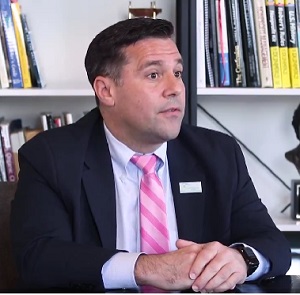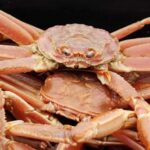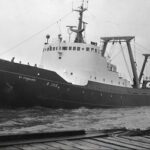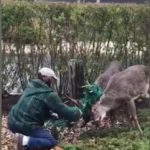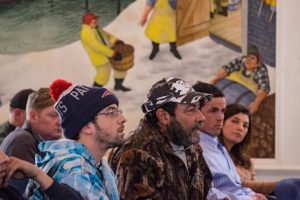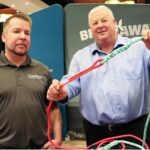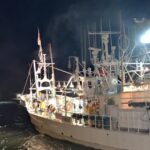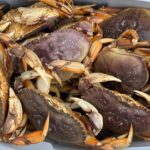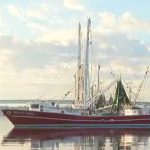Daily Archives: August 4, 2023
Too Many Seals – Canada’s Pinniped Population Problem
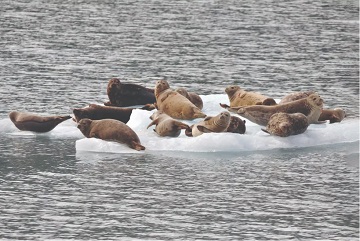 Seals in Atlantic Canada eat a lot of fish every day and there is a great deal of them, coming in at nearly 12 million animals. Their voracious appetite, according to experts, is damaging both the commercial fishery and fish stocks. Bob Hardy has spent a good portion of his life dealing with seals in one way or another. Growing up in Battle Harbour, Labrador, Hardy spent some time taking part in the inshore cod and salmon fisheries. After graduating from university, he spent nine years as a researcher before entering the seafood industry wherein he developed the first seal oil capsule that was commercially available in Newfoundland and Labrador. In 2007, he founded Hardy Fish Co., a fisheries consultancy company, where he took part in projects that researched seal oil, meat and by-product utilization. He has also spent time as a member of the Atlantic Seal Science Task Team. Hardy has since drafted a document entitled, Seals Eat Fish, highlighting the impact the large seal population has on fish stocks and the fishery itself. >click to read< 18:56
Seals in Atlantic Canada eat a lot of fish every day and there is a great deal of them, coming in at nearly 12 million animals. Their voracious appetite, according to experts, is damaging both the commercial fishery and fish stocks. Bob Hardy has spent a good portion of his life dealing with seals in one way or another. Growing up in Battle Harbour, Labrador, Hardy spent some time taking part in the inshore cod and salmon fisheries. After graduating from university, he spent nine years as a researcher before entering the seafood industry wherein he developed the first seal oil capsule that was commercially available in Newfoundland and Labrador. In 2007, he founded Hardy Fish Co., a fisheries consultancy company, where he took part in projects that researched seal oil, meat and by-product utilization. He has also spent time as a member of the Atlantic Seal Science Task Team. Hardy has since drafted a document entitled, Seals Eat Fish, highlighting the impact the large seal population has on fish stocks and the fishery itself. >click to read< 18:56
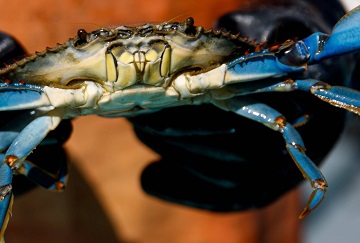
Is the answer to Maryland’s blue crab shortage in Italy?
In Italy, where the blue crab is an invasive species, population numbers are growing quickly and threatening the country’s clam industry, according to a report from Reuters. A local marine biologist told the wire service that invasive “blue crabs” (yes, they really put our beloved crustacean in scare quotes) have eaten up to 90% of young clams in some areas, devastating future production. The leading theory is the crabs were not introduced to Italy’s waters intentionally but arrived in bilge water aboard cargo ships. The region of hit hardest has lots of clam farms, giving the crabs large, dense populations of clams to feast on. Couple that with warmer water, which makes it easier for the crabs to survive the winter, and it “sounds like blue crab paradise,” Colden said. “It’s a perfect Italian vacation spot for the blue crabs in terms of lounging and getting fat and happy,” she said. >click to read< 15:31
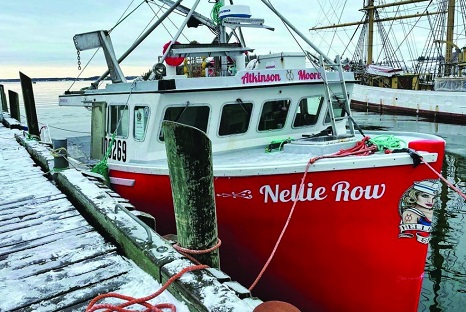
Setting Her Own Course – Lobstering with Lunenburg Harvester Gail Atkinson
Gail Atkinson is one of Canada’s very few female lobster harvesters, who employs an almost entirely female crew aboard the Nellie Row. Gail Atkinson grew up on Cape Sable Island in Southwest Nova Scotia. Coming from a long line of fish harvesters and boat builders, she originally had no desire to follow in her family’s footsteps. “I ended up starting fishing with my father,” said Atkinson. “I started when I was a little bit older because I couldn’t wait to get out of there. But, something happened, and I just ended up back there and I ended up going for a trip fishing, and I just fell in love with it. The rest was history.” Atkinson spent almost 20 years fishing with her father before she went off on her own to run an enterprise. Photos, >click to read< 13:39
Skipper in deep water again after Catlins sinking
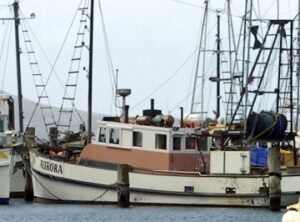 A rogue Dunedin commercial fisherman who flouted maritime rules has, like his vessel, found himself in deep water. Wayne John Jolly, 58, appeared in the Dunedin District Court this week after admitting skippering a ship without appropriate documentation and was sentenced to 250 hours’ community work. The importance of complying with such protocols was resoundingly brought home to Jolly in March last year when his boat Aurora – a 15.6m wooden trawler built in Port Chalmers in 1958 – sank about a nautical mile off the coast of the Tautuku Peninsula, in the Catlins. Jolly’s history of non-compliance with maritime law stretched back 17 years. >click to read< 10:02
A rogue Dunedin commercial fisherman who flouted maritime rules has, like his vessel, found himself in deep water. Wayne John Jolly, 58, appeared in the Dunedin District Court this week after admitting skippering a ship without appropriate documentation and was sentenced to 250 hours’ community work. The importance of complying with such protocols was resoundingly brought home to Jolly in March last year when his boat Aurora – a 15.6m wooden trawler built in Port Chalmers in 1958 – sank about a nautical mile off the coast of the Tautuku Peninsula, in the Catlins. Jolly’s history of non-compliance with maritime law stretched back 17 years. >click to read< 10:02
Oregon crabbers and environmentalists are at odds as a commission votes on rules to protect whales
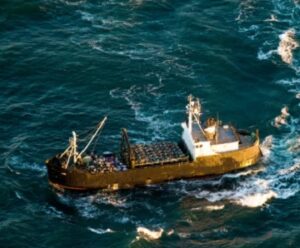 In the wheelhouse of a crab boat named Heidi Sue, Mike Pettis watched the gray whale surface and shoot water through its blowhole. Tangled around its tail was a polypropylene rope used to pull up crab traps. That was in 2004, off the waters of Waldport, Oregon. Pettis, a crab fisherman, said it’s the only time in his 44 years of fishing he has ever seen a whale caught in crab lines, and he believes that is proof such encounters are “extremely rare.” The Oregon Fish and Wildlife Commission is expected to vote Friday on whether to permanently set stricter rules and pot limits put in place in 2020 to protect whales. The restrictions, which were originally supposed to end after this season, would reduce the number of traps, known as pots, and how deep they can drop in the spring and summer months when humpbacks are more likely to encounter them. >click to read< 09:01
In the wheelhouse of a crab boat named Heidi Sue, Mike Pettis watched the gray whale surface and shoot water through its blowhole. Tangled around its tail was a polypropylene rope used to pull up crab traps. That was in 2004, off the waters of Waldport, Oregon. Pettis, a crab fisherman, said it’s the only time in his 44 years of fishing he has ever seen a whale caught in crab lines, and he believes that is proof such encounters are “extremely rare.” The Oregon Fish and Wildlife Commission is expected to vote Friday on whether to permanently set stricter rules and pot limits put in place in 2020 to protect whales. The restrictions, which were originally supposed to end after this season, would reduce the number of traps, known as pots, and how deep they can drop in the spring and summer months when humpbacks are more likely to encounter them. >click to read< 09:01
Shrimp fisherman gets back earring lost at sea 23 years ago
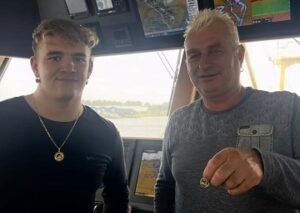 Shrimp fisherman Henk Kuiper has been reunited with an earring he lost at sea some 23 years ago, when it turned up on board another trawler, Dutch media reported on Friday. The earring features a silhouette of the trawler WR70 which actually sank some 36 years ago off the coast of Tereschelling and was of great sentimental value to Kuiper. He was on board at the time. “I was busy hosing down the decks when we were finished fishing and then I saw it stuck on the rubber edging,” trainee fisherman Noah Schroevers told the paper. “We took photos and put them online.” >click to read< 08:01
Shrimp fisherman Henk Kuiper has been reunited with an earring he lost at sea some 23 years ago, when it turned up on board another trawler, Dutch media reported on Friday. The earring features a silhouette of the trawler WR70 which actually sank some 36 years ago off the coast of Tereschelling and was of great sentimental value to Kuiper. He was on board at the time. “I was busy hosing down the decks when we were finished fishing and then I saw it stuck on the rubber edging,” trainee fisherman Noah Schroevers told the paper. “We took photos and put them online.” >click to read< 08:01






